Unit 6 Lesson 31 What Strange Weather!课件 (共22张PPT)
文档属性
| 名称 | Unit 6 Lesson 31 What Strange Weather!课件 (共22张PPT) |

|
|
| 格式 | pptx | ||
| 文件大小 | 26.5MB | ||
| 资源类型 | 教案 | ||
| 版本资源 | 冀教版 | ||
| 科目 | 英语 | ||
| 更新时间 | 2022-04-16 12:05:38 | ||
图片预览

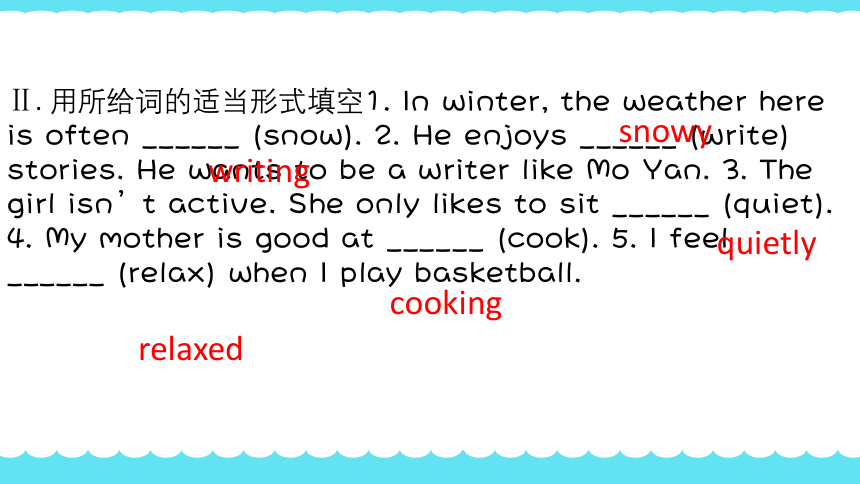
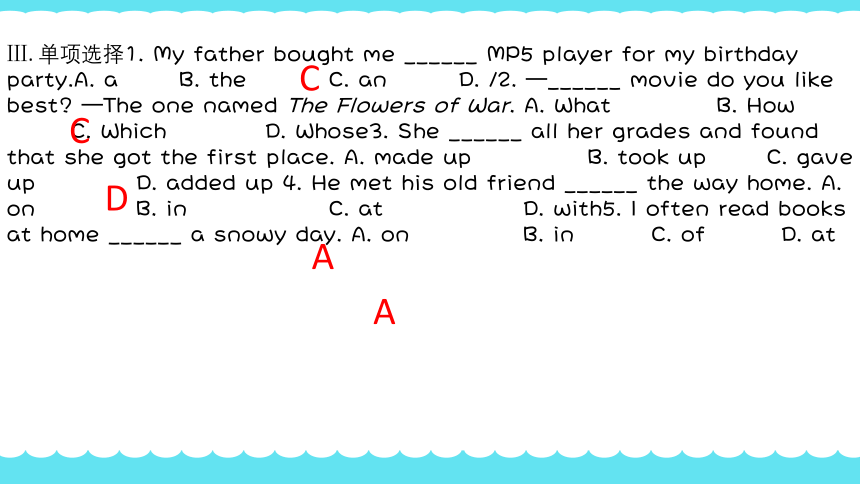
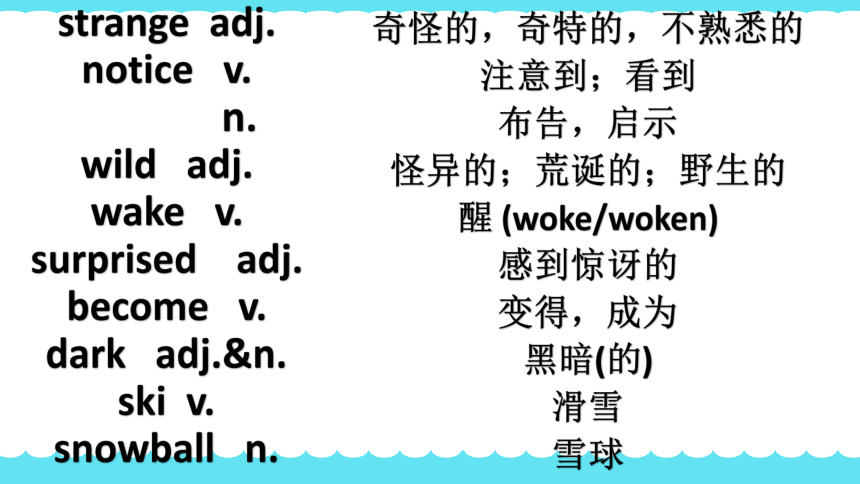
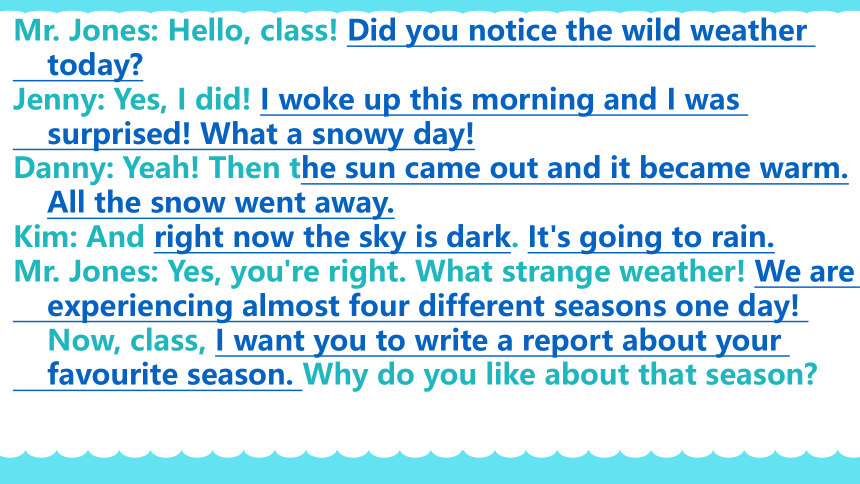
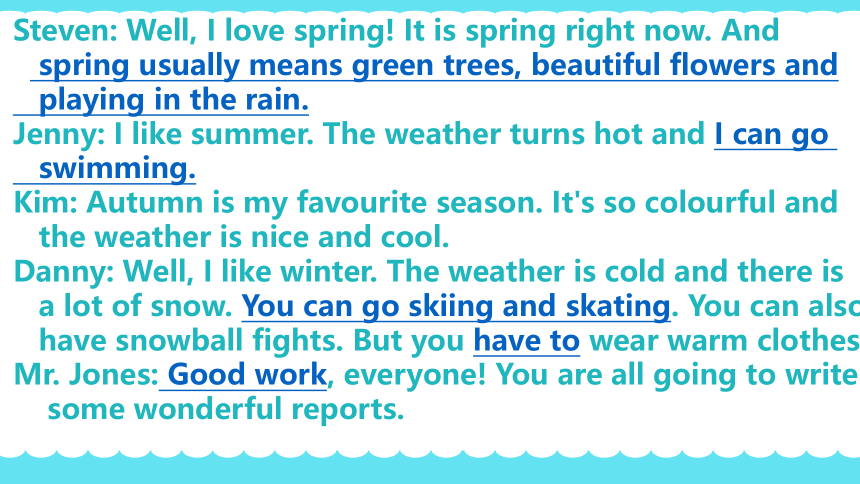

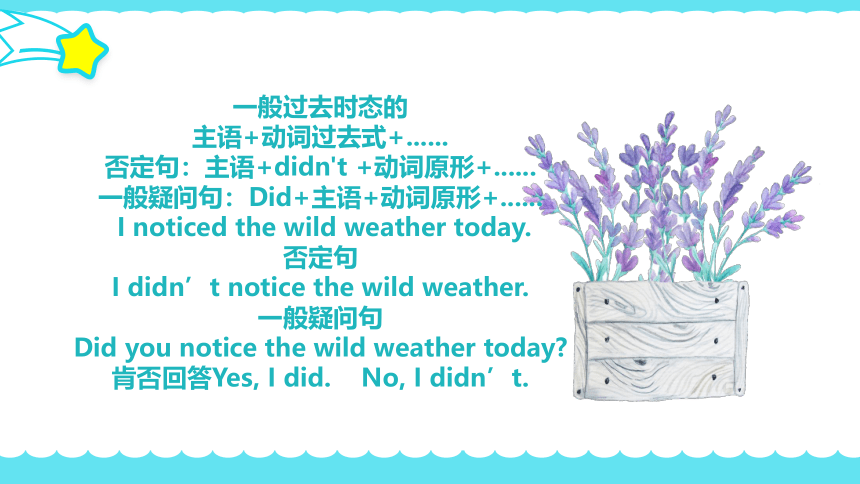
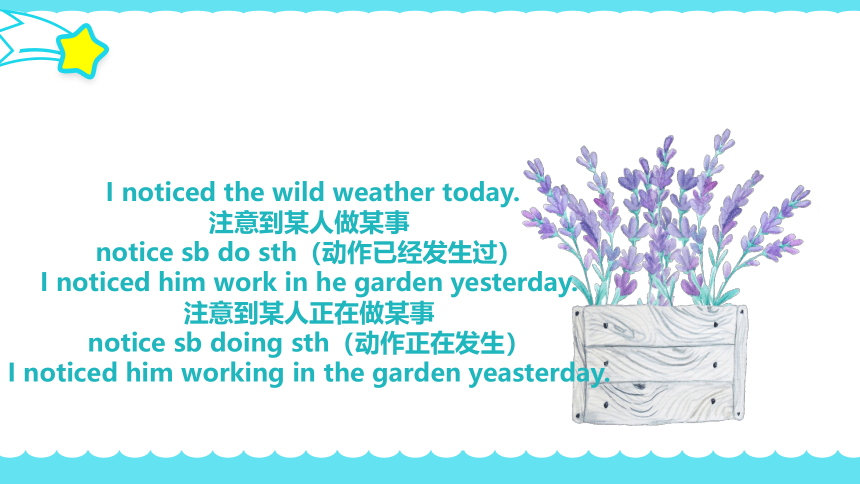
文档简介
(共22张PPT)
lesson 31
what strange weather!
Ⅱ. 用所给词的适当形式填空1. In winter, the weather here is often ______ (snow). 2. He enjoys ______ (write) stories. He wants to be a writer like Mo Yan. 3. The girl isn’t active. She only likes to sit ______ (quiet). 4. My mother is good at ______ (cook). 5. I feel ______ (relax) when I play basketball.
snowy
writing
quietly
cooking
relaxed
Ⅲ. 单项选择1. My father bought me ______ MP5 player for my birthday party.A. a B. the C. an D. /2. —______ movie do you like best —The one named The Flowers of War. A. What B. How C. Which D. Whose3. She ______ all her grades and found that she got the first place. A. made up B. took up C. gave up D. added up 4. He met his old friend ______ the way home. A. on B. in C. at D. with5. I often read books at home ______ a snowy day. A. on B. in C. of D. at
C
C
D
A
A
strange adj.
notice v.
n.
wild adj.
wake v.
surprised adj.
become v.
dark adj.&n.
ski v.
snowball n.
奇怪的,奇特的,不熟悉的
注意到;看到
布告,启示
怪异的;荒诞的;野生的
醒 (woke/woken)
感到惊讶的
变得,成为
黑暗(的)
滑雪
雪球
Mr. Jones: Hello, class! Did you notice the wild weather
today
Jenny: Yes, I did! I woke up this morning and I was
surprised! What a snowy day!
Danny: Yeah! Then the sun came out and it became warm.
All the snow went away.
Kim: And right now the sky is dark. It's going to rain.
Mr. Jones: Yes, you're right. What strange weather! We are
experiencing almost four different seasons one day!
Now, class, I want you to write a report about your
favourite season. Why do you like about that season
Steven: Well, I love spring! It is spring right now. And
spring usually means green trees, beautiful flowers and
playing in the rain.
Jenny: I like summer. The weather turns hot and I can go
swimming.
Kim: Autumn is my favourite season. It's so colourful and
the weather is nice and cool.
Danny: Well, I like winter. The weather is cold and there is
a lot of snow. You can go skiing and skating. You can also
have snowball fights. But you have to wear warm clothes.
Mr. Jones: Good work, everyone! You are all going to write
some wonderful reports.
I woke up this morning and I was surprised!
1、醒来
wake up
把我叫醒
wake me up 代词放中间
2、吃惊的
be surprised
一般过去时态的
主语+动词过去式+......
否定句:主语+didn't +动词原形+......
一般疑问句:Did+主语+动词原形+......
I noticed the wild weather today.
否定句
I didn’t notice the wild weather.
一般疑问句
Did you notice the wild weather today
肯否回答Yes, I did. No, I didn’t.
I noticed the wild weather today.
注意到某人做某事
notice sb do sth(动作已经发生过)
I noticed him work in he garden yesterday.
注意到某人正在做某事
notice sb doing sth(动作正在发生)
I noticed him working in the garden yeasterday.
The sun came out and it became warm.
come out
开花,出版,出现
All the snow went away.
go away
离开
Right now the sky is dark.
right now
此刻
It’s going to rain.
要下雨了
多么奇怪的天气呀
What strange weather!
How stronge the weather is!
多么多雪的日子呀!
What a snowy day!
How snowy the day is!
感叹句
How +形容词+主谓
What+(a/an) +形容词+名词+主谓
_______ beautiful girls.
___________ beautiful the girls are.
___________ wonderful weather.
What
How
What
We are experiencing almost four different seasons in a year.
我们在一天内几乎正在经历着四个不同的季节。
1、experience v.经历
n. 经历 可数名词
经验 不可数名词
2、almost 和nearly 的区别
副词 差不多,几乎
It was almost\nearly midnight.
否定词 no, nothing等之前不用nearly,只能用almost
I konw almost nothing about him.
I want you to write a report about your
favourite season.
1、want sb. to do sth.
想要某人做某事
2、write a report about....
写一个关于...的报告
Spring usually means green trees, beautiful flowers and playing in the rain.
mean doing sth
意味着做某事
mean to do sth
打算做某事
I mean __________ here for a long time.
Being a student means _________(study) hard.
to stay
studying
I can go swimming.
go swimming
去游泳
go skating=go ice skating
去滑冰
go skiing
去滑雪
不得不have to do sth. 必须must
区别
have to 表客观由于外界环境“不得不…”
must表主观自我意识到“必须…”
It's too late. I have to go home.
I must be there on time.
good work
做的好
ZHANG
see you next time!
lesson 31
what strange weather!
Ⅱ. 用所给词的适当形式填空1. In winter, the weather here is often ______ (snow). 2. He enjoys ______ (write) stories. He wants to be a writer like Mo Yan. 3. The girl isn’t active. She only likes to sit ______ (quiet). 4. My mother is good at ______ (cook). 5. I feel ______ (relax) when I play basketball.
snowy
writing
quietly
cooking
relaxed
Ⅲ. 单项选择1. My father bought me ______ MP5 player for my birthday party.A. a B. the C. an D. /2. —______ movie do you like best —The one named The Flowers of War. A. What B. How C. Which D. Whose3. She ______ all her grades and found that she got the first place. A. made up B. took up C. gave up D. added up 4. He met his old friend ______ the way home. A. on B. in C. at D. with5. I often read books at home ______ a snowy day. A. on B. in C. of D. at
C
C
D
A
A
strange adj.
notice v.
n.
wild adj.
wake v.
surprised adj.
become v.
dark adj.&n.
ski v.
snowball n.
奇怪的,奇特的,不熟悉的
注意到;看到
布告,启示
怪异的;荒诞的;野生的
醒 (woke/woken)
感到惊讶的
变得,成为
黑暗(的)
滑雪
雪球
Mr. Jones: Hello, class! Did you notice the wild weather
today
Jenny: Yes, I did! I woke up this morning and I was
surprised! What a snowy day!
Danny: Yeah! Then the sun came out and it became warm.
All the snow went away.
Kim: And right now the sky is dark. It's going to rain.
Mr. Jones: Yes, you're right. What strange weather! We are
experiencing almost four different seasons one day!
Now, class, I want you to write a report about your
favourite season. Why do you like about that season
Steven: Well, I love spring! It is spring right now. And
spring usually means green trees, beautiful flowers and
playing in the rain.
Jenny: I like summer. The weather turns hot and I can go
swimming.
Kim: Autumn is my favourite season. It's so colourful and
the weather is nice and cool.
Danny: Well, I like winter. The weather is cold and there is
a lot of snow. You can go skiing and skating. You can also
have snowball fights. But you have to wear warm clothes.
Mr. Jones: Good work, everyone! You are all going to write
some wonderful reports.
I woke up this morning and I was surprised!
1、醒来
wake up
把我叫醒
wake me up 代词放中间
2、吃惊的
be surprised
一般过去时态的
主语+动词过去式+......
否定句:主语+didn't +动词原形+......
一般疑问句:Did+主语+动词原形+......
I noticed the wild weather today.
否定句
I didn’t notice the wild weather.
一般疑问句
Did you notice the wild weather today
肯否回答Yes, I did. No, I didn’t.
I noticed the wild weather today.
注意到某人做某事
notice sb do sth(动作已经发生过)
I noticed him work in he garden yesterday.
注意到某人正在做某事
notice sb doing sth(动作正在发生)
I noticed him working in the garden yeasterday.
The sun came out and it became warm.
come out
开花,出版,出现
All the snow went away.
go away
离开
Right now the sky is dark.
right now
此刻
It’s going to rain.
要下雨了
多么奇怪的天气呀
What strange weather!
How stronge the weather is!
多么多雪的日子呀!
What a snowy day!
How snowy the day is!
感叹句
How +形容词+主谓
What+(a/an) +形容词+名词+主谓
_______ beautiful girls.
___________ beautiful the girls are.
___________ wonderful weather.
What
How
What
We are experiencing almost four different seasons in a year.
我们在一天内几乎正在经历着四个不同的季节。
1、experience v.经历
n. 经历 可数名词
经验 不可数名词
2、almost 和nearly 的区别
副词 差不多,几乎
It was almost\nearly midnight.
否定词 no, nothing等之前不用nearly,只能用almost
I konw almost nothing about him.
I want you to write a report about your
favourite season.
1、want sb. to do sth.
想要某人做某事
2、write a report about....
写一个关于...的报告
Spring usually means green trees, beautiful flowers and playing in the rain.
mean doing sth
意味着做某事
mean to do sth
打算做某事
I mean __________ here for a long time.
Being a student means _________(study) hard.
to stay
studying
I can go swimming.
go swimming
去游泳
go skating=go ice skating
去滑冰
go skiing
去滑雪
不得不have to do sth. 必须must
区别
have to 表客观由于外界环境“不得不…”
must表主观自我意识到“必须…”
It's too late. I have to go home.
I must be there on time.
good work
做的好
ZHANG
see you next time!
同课章节目录
- Unit 1 A Trip to the Silk Road
- Lesson 1 A Trip to China
- Lesson 2 Meet You in Beijing
- Lesson 3 A Visit to Xi'an
- Lesson 4 A Visit to Lanzhou
- Lesson 5 Another Stop along the Silk Road
- Lesson 6 Jenny's Diary
- Unit 2 It's Show Time!
- Lesson 7 What's Your Project about?
- Lesson 8 Marco Polo and the Silk Road
- Lesson 9 Danny's School Project
- Lesson 10 Music and Dance
- Lesson 11 Food in China
- Lesson 12 A Blog about the Silk Road
- Unit 3 School Life
- Lesson 13 How Is School Going?
- Lesson 14 Jenny's School Life
- Lesson 15 Making a Difference
- Lesson 16 We Are with You!
- Lesson 17 School Science Fai
- Lesson 18 Teaching in China
- Unit 4 After-School Activities
- Lesson 19 A Dinner Date
- Lesson 20 Join Our Club!
- Lesson 21 What Is Your Club Type?
- Lesson 22 Big Plans for the Weekend
- Lesson 23 A Weekend with Grandma
- Lesson 24 How was Your Weekend?
- Unit 5 I Love Learning English!
- Lesson 25 A Phone Friend
- Lesson 26 Online Phone Calls
- Lesson 27 Amazing English
- Lesson 28 How Do I Learn English?
- Lesson 29 A Door to the World
- Lesson 30 Writing an E-mail in English
- Unit 6 Seasons
- Lesson 31 What Strange Weather!
- Lesson 32 I Can't Wait for Winter!
- Lesson 33 Kim's Favourite Season
- Lesson 34 Steven's Report
- Lesson 35 Surfing in Sydney
- Lesson 36 Spring in China
- Unit 7 Sports and Good Health
- Lesson 37 You Are What You Eat!
- Lesson 38 Stay Healthy!
- Lesson 39 Danny's Report
- Lesson 40 Move Your Body
- Lesson 41 Were People Healthy Then?
- Lesson 42 Know Yourself
- Unit 8 Summer Holiday Is Coming!
- Lesson 43 Have a Good Summer!
- Lesson 44 Volunteering in Summe
- Lesson 45 Baseball Season
- Lesson 46 Get Ready for Summer Holiday!
- Lesson 47 Summer Plans
- Lesson 48 Li Ming's Summer Holiday
